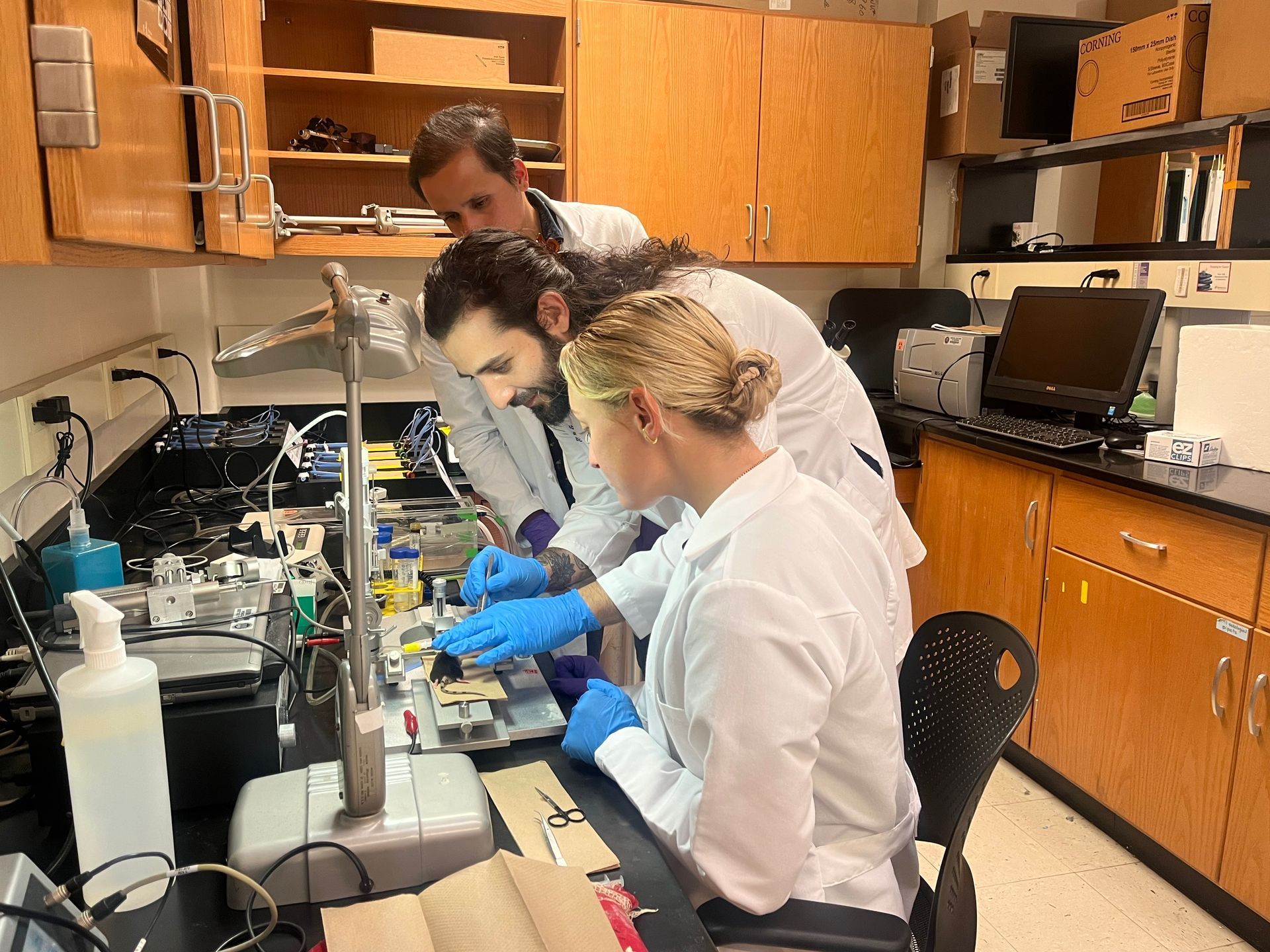AREA OF RESEARCH
BRAIN CANCER &
ALZHEIMER'S
THRIFTMASTER GLOBAL BIOSCIENCES
AREA OF RESEARCH
BRAIN CANCER & ALZHEIMER'S
RESEARCH
Introduction
Alzheimer’s
There is a dire need for due innovative therapeutic modalities to improve AD patients outcomes. In this study, we tested whether Cannabidiol (CBD) improves outcomes in a translational model of familial AD and to investigate if CBD regulates interleukin (IL)-33 and triggering receptor expressed on myeloid cells 2 (TREM2), which are associated with improved cognitive function. CBD was administered to 5xFAD mice, which recapitulate early onset, familial AD. Behavioral tests and immunoassays were used to evaluate cognitive and motor outcomes. Our findings suggest that CBD treatment enhanced IL-33 and TREM2 expression, ameliorated the symptoms of AD, and retarded cognitive decline.
In this study, we report, for the first time, that CBD increases expression of IL-33 and TREM2, reduces serum IL-6 levels, and ameliorates the symptoms of AD with improved cognitive function in 5xFAD mice. These findings suggest a potential therapeutic role for CBD in the treatment of AD through a bi-directional dialogue with IL-33 and TREM2 signaling.
Discussion
Alzheimer’s
All currently approved treatments for AD mitigate symptoms rather than directly address the underlying pathophysiological processes. Our findings presented herein identify a direct therapeutic benefit of CBD in an experimental model of early-onset familial AD. Consistent with putative protective roles for IL-33 and TREM2 in AD [11,14], we found that CBD dramatically elevated IL-33 and TREM2 expression in glial cells while suppressing pro-inflammatory IL-6 expression in peripheral blood leukocytes in proportion to cognitive improvements. Interestingly, TREM2 is implicated in microglial phagocytosis; thus, it is notable that CBD increased TREM2 expression in parallel to reduced beta amyloid within brain tissue, suggesting CBD may reduce beta amyloid production and/or aid in clearance of beta amyloid. Similarly, CBD stimulated astrocytic expression of IL-33, a cytokine that enhanced microglial mediated phagocytosis of beta amyloid and improved contextual memory in a mouse model of AD. Thus, CBD may represent a clinically-safe and efficacious disease-modifying therapy to attenuate neurocognitive decline, at least in part, via modulation of glial cell function. This intriguing finding and issues such as CBD dosing, type (e.g., isolate CBD vs full spectrum CBD) in AD treatment as well as the effects of sex-dimorphism, age and the relationship with CBD treatment on outcomes of AD and other dementias warrants further exploration.
ABSTRACT
Brain Cancer
Glioblastoma (GBM) is an extremely aggressive primary brain tumor with poor prognosis, short survival time post-diagnosis and high recurrence. Currently, no cure for GBM exists. The identification of an effective therapeutic modality for GBM remains a high priority amongst medical professionals and researches. In recent studies, inhalant cannabidiol (CBD) has demonstrated promise in effectively inhibiting GBM tumor growth. However, exactly how CBD treatment affects the physiology of these tumor cells remains unclear. Stress granules (SG) (a sub-class of biomolecular condensates (BMC)) are dynamic, membrane-less intracellular microstructures which contain proteins and nucleic acids. The formation and signaling of SGs and BMCs plays a significant role in regulating malignancies. This study investigates whether inhaled CBD may play an intervening role towards SGs in GBM tumor cells. Integrated bioinformatics approaches were preformed to gain further insights. This includes use of Immunohistochemistry and flow cytometry to measure SGs, as well as expression and phosphorylation of eukaryotic initiation factor-2α (eIF2α). The findings of this study reveal that CBD receptors (and co-regulated genes) have the potential to play an important biological role in the formation of BMCs within GBM. In this experiment, CBD treatment significantly increased the volume of TIAR-1. This increase directly correlated with elevation in both eIF2α expression and p-eIF2α in CBD treated tissues in comparison to the placebo group (p < 0.05). These results suggest that inhalant CBD significantly up-regulated SGs in GBM, and thus support a theory of targeting BMCs as a potential therapeutic substrate for treating GBM. Glioblastoma (GBM) is an extremely aggressive primary brain tumor with poor prognosis, short survival time post-diagnosis and high recurrence. Currently, no cure for GBM exists. The identification of an effective therapeutic modality for GBM remains a high priority amongst medical professionals and researches. In recent studies, inhalant cannabidiol (CBD) has demonstrated promise in effectively inhibiting GBM tumor growth. However, exactly how CBD treatment affects the physiology of these tumor cells remains unclear. Stress granules (SG) (a sub-class of biomolecular condensates (BMC)) are dynamic, membrane-less intracellular microstructures which contain proteins and nucleic acids. The formation and signaling of SGs and BMCs plays a significant role in regulating malignancies. This study investigates whether inhaled CBD may play an intervening role towards SGs in GBM tumor cells. Integrated bioinformatics approaches were preformed to gain further insights. This includes use of Immunohistochemistry and flow cytometry to measure SGs, as well as expression and phosphorylation of eukaryotic initiation factor-2α (eIF2α). The findings of this study reveal that CBD receptors (and co-regulated genes) have the potential to play an important biological role in the formation of BMCs within GBM. In this experiment, CBD treatment significantly increased the volume of TIAR-1. This increase directly correlated with elevation in both eIF2α expression and p-eIF2α in CBD treated tissues in comparison to the placebo group (p < 0.05). These results suggest that inhalant CBD significantly up-regulated SGs in GBM, and thus support a theory of targeting BMCs as a potential therapeutic substrate for treating GBM.
learn more about THE RESEARCH ON BRAIN CANCER & ALZHEIMER'S






